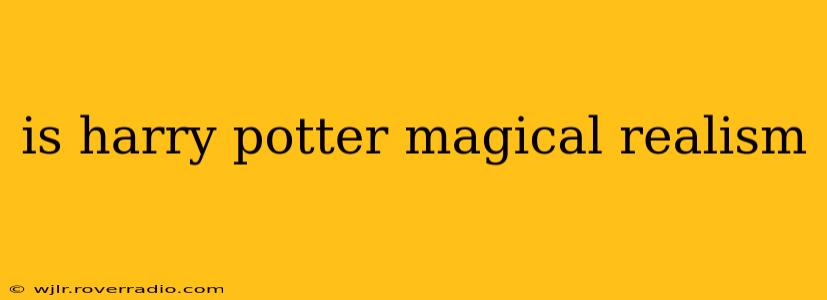The question of whether the Harry Potter series falls squarely into the magical realism genre is a fascinating one, sparking debate among literary scholars and fans alike. While the series undeniably features magic and fantastical elements, a closer examination reveals a nuanced relationship with the conventions of magical realism. This exploration will delve into the key characteristics of magical realism and assess how well they align with J.K. Rowling's iconic creation.
What Defines Magical Realism?
Magical realism, at its core, seamlessly blends fantastical elements with ordinary reality. It doesn't present magic as something extraordinary or separate; instead, it integrates it naturally into the everyday lives of characters, often without explicit explanation or fanfare. Key characteristics include:
- Mundane Setting: The story is typically set in a recognizable, real-world location, often with a focus on specific cultural contexts.
- Unremarkable Magic: Magical events are presented as ordinary occurrences, accepted by characters as part of their reality.
- Ambiguity and Blurred Lines: The boundaries between the real and the magical are deliberately hazy, leaving room for interpretation.
- Social Commentary: Magical realism frequently uses fantasy elements to explore deeper social and political themes.
How Does Harry Potter Measure Up?
While Harry Potter features magic, its presentation doesn't perfectly mirror the core tenets of magical realism. Let's examine some points:
Setting: The wizarding world, while interwoven with the Muggle (non-magical) world, exists as a largely separate entity. This distinct separation differs from the seamless integration found in many examples of magical realism.
Magic's Presentation: While magic is central, it's not presented as unremarkable to all characters. The Muggle world remains unaware of the magical one, highlighting a distinct divide rather than seamless integration. The characters within the wizarding world, though accepting of magic, often encounter situations where the magic is extraordinary and requires explanation or further exploration.
Ambiguity and Blurred Lines: The Harry Potter series, while possessing moments of ambiguity, generally maintains a clear distinction between magic and the Muggle world. The rules of magic, though complex, are relatively well-defined within the narrative.
Social Commentary: While the series touches upon themes of prejudice, social class, and good versus evil, these themes aren't as directly interwoven with the magical elements as in classic magical realism. The magic often serves as a plot device rather than a primary tool for social critique.
Is It Fantasy, Then?
The more accurate genre classification for Harry Potter is arguably high fantasy. This genre features a completely realized secondary world with its own cultures, laws, and magical systems. The scope and scale of the magic, along with the extensive world-building, firmly place it within high fantasy, rather than magical realism.
Frequently Asked Questions (FAQs)
What are some examples of magical realism in literature?
Examples of magical realism include Gabriel García Márquez's One Hundred Years of Solitude and Isabel Allende's The House of the Spirits. These works seamlessly blend the fantastical with the everyday, often reflecting social and political realities.
Is there any overlap between magical realism and fantasy?
Yes, there can be overlap. Some works might blend elements of both genres, making definitive categorization challenging. The key difference often lies in the presentation of the magical elements and their integration into the narrative's reality.
Why is genre classification important?
Genre classification helps readers find books they'll enjoy. Understanding the conventions of different genres allows for better appreciation and critical analysis of literature.
In conclusion, while Harry Potter features magic, it doesn't fully align with the defining characteristics of magical realism. Its distinct world-building, defined magical rules, and separate magical and non-magical societies place it more firmly within the realm of high fantasy. The debate, however, highlights the fluid and often overlapping nature of literary genres.
